Sharing 2 – Lay Marist Newsletter
Sharing. The Lay Marist Vocation (Lay Marist Newsletter)
Mary, the dawn breeze
Br. Javier Espinosa
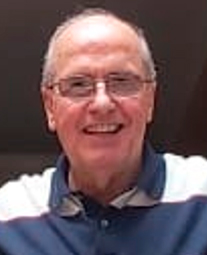
I am writing this on a morning in the month of May, recalling an early morning walk through the Novitiate orchard, singing to Mary and contemplating the almond and cherry blossoms, as well as the white daisies sprouting among the green grass. All my senses registered the morning dew, life stirring, the scent of spring, the air of dawn. The first days of May brought refreshing breezes, longer and sunnier days, and walks among the fruit trees. That is why the month of May as the month of Mary perked me up and made me feel happy. Mary was song, new day, flower of the field. May-in-flower was for me a symbol of Mary’s tenderness, her beauty, her clean look, her unclouded vision.
Mary, like the breeze at dawn, inspired and guided Champagnat at the beginning of the Institute. She was the fresh water of the Gier. The star of the night of the “Memorare”. The warm bread of La Valla. The silence and peacefulness of the Hermitage valley. The warmth and affection of Champagnat. The innocence of the children of our first schools. The sturdy rock on which our new home was built. The unrushed awakening of the first community singing the Salve. The International Forum on the Lay Marist Vocation opens us to hope, invites us to dream together, motivates us to care for life and to generate new life. The process of the Forum points to a new dawn where Mary appears as a meeting point, as a memory of beginnings, as a felt presence, as a mark of identity. She is the Woman of unfailing love, the one who brings happiness and encouragement. Mary is our Mother, gathering us in a spirit of communion. Mary is newness personified.
The discernment we have begun is underpinned by Marcellin’s deepest certainties that should accompany us on this journey towards greater vitality of the charism. We remember them with a grateful heart.
We bear the name of Mary
Names are an attribute of personalities, the way we single people out within a given community. Our name is our first sign of identity, by which we will be known and which makes us someone. During one of his frequent visits to the Blessed Virgin, Marcellin was inspired to found a congregation of teachers and to give them the name of the one who had inspired his project. Feeling a special pleasure in honouring the Blessed Virgin, and supposing that everyone would feel the same way, he thought that the name of Mary alone would be enough to attract candidates to the congregation he was thinking of founding. And he was right.
For Champagnat, living up to our name is to count on her for everything. So many expressions of our Founder confirm this: “God has loved us from all eternity; he has chosen us. The Blessed Virgin planted us in her garden. She sees to it that we lack for nothing”. “Do not be afraid, we have Mary to defend us.” “Mary does not abandon us…. Mary helps us and that is enough.” And the expression he used in his letter to Brother Antoine is especially strong: “Interest Mary on your behalf; tell her that after you have done everything possible, so much the worse for her if things do not go as they should. Recommend your children often to her.”
To bear Mary’s name means to translate Mary’s spirit into our way of growing in our vocation, and to make her example a guide for our whole lives, giving a Marian ‘flavour’ to our presence in the Church and in our world.
She has done everything for us
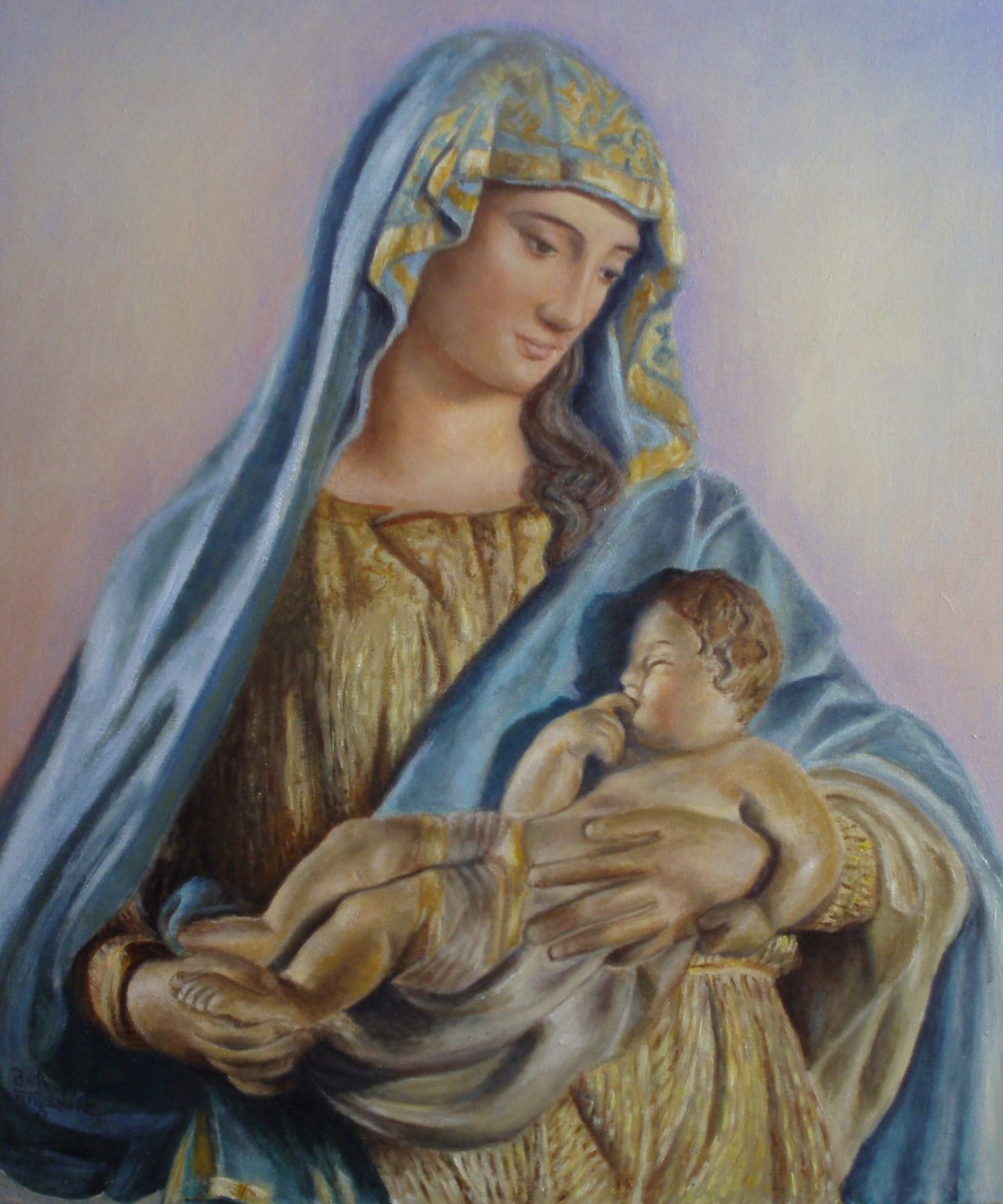
“Mary alone is the cause of our prosperity; without Mary we are nothing and with Mary we have everything, because Mary always has her adorable son either in her arms or in her heart.” This is how Marcellin expressed himself, so familiarly and yet so radically. So great was his confidence in Mary that nothing seemed impossible with her help. He was heard to say repeatedly: “Even if the whole earth were against us, we have nothing to fear if the Mother of God is with us”.
In the mind of the Founder, says Br. Jean-Baptiste, everything in the Institute must belong to Mary and everything must be used for her glory. To love this revered Queen, serve her, and propagate her devotion, according to the spirit of the Church, as an excellent means of loving and serving Jesus Christ more easily and more perfectly: such was the purpose he set for himself in founding the Institute. Marcellin saw himself as a supporter of Mary’s plans, not as the initiator of one of his own, and so he wrote these words: “Let us tell Mary that this is her work much more than ours”. At the end of 1821, when the Institute seemed to be dying out “like a lamp without oil”, he turned to her, saying: “If you do not come to our aid, we shall perish…. But if this work should perish, it is not our work that fails, but yours…”
“Mary means everything for our Marist society,” Marcellin said with great conviction in the early days of the Institute. Such confidence was the pattern of his whole life as he entrusted all his projects to Mary. In this spirit, he created a family spirit of authenticity, simplicity, mutual affection, peaceful calm, joy and moderation. The Forum process invites us on a path of communion, where Mary, like the dawn breeze, is smile, heart, and gentleness. She shows us how to lead an inner life, to contemplate, to be fruitful, tender, and transparent. A pure heart, like Mary’s, never stops loving; loving without manipulating, without possessing, in Jesus. We need such a pure heart to follow the path of communion inherent in the Forum process.
Mary represents promise
A May morning, that’s Mary. In the morning something comes to birth, life awakens, light appears, a new day begins. With Mary there is promise, an invitation to hope. She encourages and inspires. Marcellin’s testimony tells us that with Mary we can dream, imagine and create. With Mary there is no room for insecurity or fear, pessimism or despair. Our identity involves this Marian attitude, which sheds light on how we go about discerning our Marist vocation. She is the one who listened to the Lord, who wanted answers and asked questions. She discerned. She believed despite the uncertainty of the moment. She remained faithful when anxiety and indecision would have been understandable. She became a happy and richly fruitful mother. Her faith was seen in her smile and sweetness, as well as her tears and the pain of the cross; in the home of Nazareth as well as on the road to Calvary; in her experience of being left alone in the world as well as on the morning of resurrection.
Hand in hand with Mary, we ponder on the ideas that are coming up. With her by our side, we make our way with dirt on our feet. Like her, sure of God’s fidelity, we welcome the newness and the prospects that this gospel adventure of generating new life for the Marist charism offers us over the coming four years.
“This is her work much more than ours”, Champagnat said at the beginning of the Institute. So, the idea of an International Forum can be seen as a gift from Mary to the Institute. And that gift brings us freshness, sensitivity to the signs of the times, wonderful dreams, responsible non-conformity, creativity and inventiveness. It is the presence of Grace in our history, making it life-giving, hopeful, generous, and adventurous. It is a powerful impulse of the Spirit ever giving birth to life.
The dawn breeze that is Mary makes us look to the future with hope, invites us to dream together, to let ourselves be carried by the strength of the Gospel, to believe that we can be reborn, to experience that happiness and joy go hand in hand with our Marist vocation, and to go out of ourselves to encounter God who continues to appear every day, giving direction to history. In this way, the experience of the Forum can become a beautiful morning in the month of May.
Lay Marists: a vocation for the 21st century
Manu Gómez Cid – Assistant Director of the Secretariat of the Laity
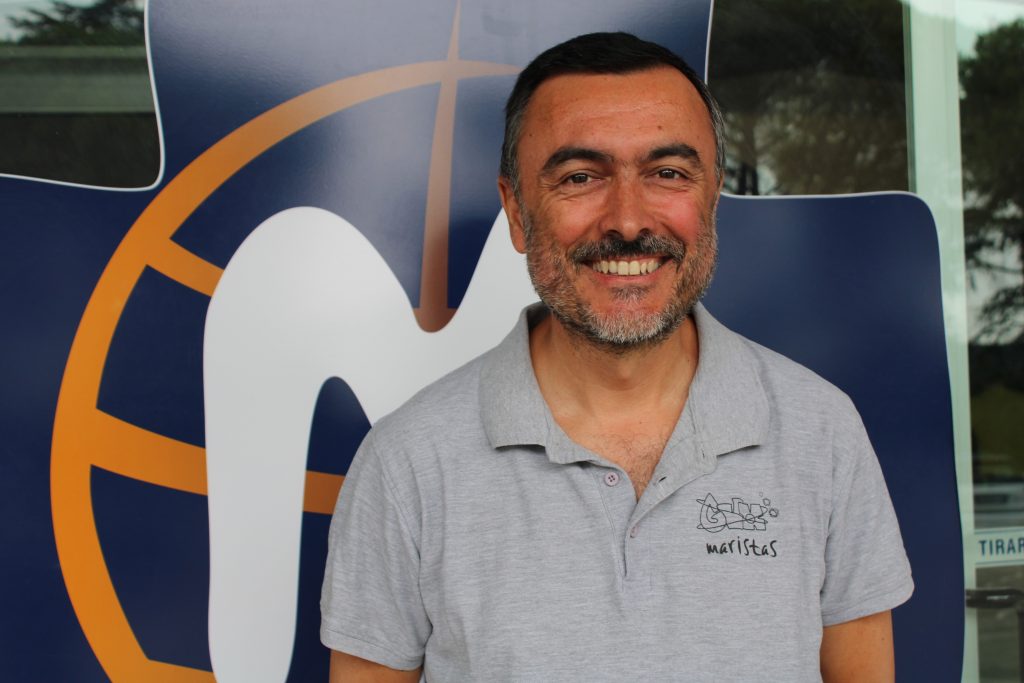
In this second issue of the new bulletin “Sharing” we are adding a section in which we will present different in-depth reflection. These will allow us to focus our understanding of different themes in order to grow, more specifically, in our lay Marist vocation. In this first reflection, we will take a closer look at the theme that appears in the title: “LAY MARISTS: A VOCATION FOR THE 21ST CENTURY”.
It is more than a decade since the publication of the document ” Gathered around the same table. The Vocation of Champagnat’s Lay Marists” (EMM). In many parts of the Marist world we can see a growing awareness of the significance of this expression of Marcellin’s charism: the lay Marist vocation. In EMM, the foundations were laid for giving it official status and insights were provided for the future. Among others, the need to create accompanied formative itineraries that would allow for processes of vocational discernment (EMM 146-169). In this sense, the reference document “Being a Lay Marist “, presented at the last General Chapter of 2017, is the fruit of the work of the continental commissions of the laity. We can see that several Provinces in the Institute have already implemented these programmes, with teams of people who accompany others in their vocational processes, as lay men and women, in the Marist charism.
The need to express personal responses through gestures and public commitments of charismatic attachment or the possibility of creating associative structures of a lay character recognised by the ecclesial community was also envisaged (EMM 134, 140, 142, 143). These proposals continue to take shape, and we can discover some experiences that are already being carried out in some Administrative Units. They will be shared with us in future issues of this bulletin.
The “INTERNATIONAL FORUM ON THE LAY MARIST VOCATION”, a process which has already begun and which will culminate in 2024, will be a wonderful opportunity to expand on these intuitions and will help us to take concrete and visible steps, especially with regard to charismatic links or associative structures.
Lay people by vocation
The 21st century is bringing about a great change in the history of Christianity and of the Catholic Church in particular. And this time will certainly involve a new awareness of the laity as a vocation.
Last year 2020, just as the COVID’19 pandemic was beginning to spread throughout our world, an ecclesial event was held in Spain that would mark a before and after in the life of the laity in the Spanish Church. For the first time, a “National Congress of the Laity” was convened, promoted and encouraged by the Bishops’ Conference. More than 2,000 representatives from Spanish dioceses, parishes, ecclesial movements and religious congregations took part in this event.
I would like to highlight an expression that lifted the audience out of their seats with a standing ovation. A layman from the diocese of Toledo, coordinator of the Congress, expressed the following in his opening remarks: “We are not lay people by default. We are lay people by VOCATION”.
Pope Francis himself, in his speech to the members of the National Council of Italian Catholic Action on 30 April 2021, said: “In the Church, the voice of the laity must not be heard “by concession”, no. Sometimes the voice of the priests and the laity is not heard “by concession”. Sometimes the voice of the priests, or of the bishops, must be heard, and at times “by concession”; it must always be “by right”. But also that of the laity “by right”, not “by concession”. Both.”
These two examples place us clearly in the context of the times we are living through in relation to the laity within our Church and which, since the Second Vatican Council, have tried to be made concrete with different expressions, experiences, paths or structures. In various reflections, reference is made to “the hour of the laity”.
That is to say, in the 21st century we have the opportunity for a real recognition of the lay vocation in the Church, and not only in declarations full of good intentions, but with concrete signs of co-responsibility and communion.
Being lay Marists. A gift that we welcome with grateful remembrance
In the process of discovering our lay Marist vocation there is a first moment of becoming aware of the gift we have received. We experience feeling loved as God’s favourite sons and daughters, chosen in a personal way to collaborate with Him in His project of building a fraternal humanity.
And in the experience of contemplating God’s passage through our lives we discover, with grateful memory, the history of so many generations of Marists who, since the time of Father Champagnat, have been a living witness of dedication in the mission of “making Jesus Christ known and loved” to the children and young people of each of our countries.
Each one of us will be able to name and remember the concrete faces of Marists, brothers, lay people and laypeople, whose lives have challenged us and have impelled us to deepen our own personal vocation. Marists who have lived and passed on their experience of God, their experience of fraternity or their passion for mission. Thanks to all of them, today we can say that we want to live our lay vocation as Marists. Let us remember them so that we can continue to love and live our vocation creatively.
Marist Laypeople, Street Mystics
José Tolentino Mendoça tells us in his book The Mysticism of the Moment: “In a kind of spiritual testament, the theologian Karl Rahner made the following statement: “Christians of the future will either be mystics or they will not be Christian”! In his opinion, there are two emerging features in the profile of contemporary believers: on the one hand, our spirituality needs to be lived continually in the first person, calling for an indispensable awakening of consciousness; and on the other, calling for us to be courageous in making a decision of faith in the Spirit, the Giver of Life and Power. We have a real, personal experience of God and his Spirit“. (Tolentino Mendoça, José. La mística del instante. El tiempo y la promesa. [The Mysticism of the Moment. Time and promise]. Verbo Divino – 2020).
If we truly believe what is being said here, we will seek a personal relationship with the God of Jesus, cultivating silence in our daily lives, a contemplative attitude, a down-to-earth spirituality and an open-eyed mysticism. That is, we are called to live a true experience of the Spirit in our daily and secular context.
It means living with the conviction expressed by the French laywoman Madeleine Delbrêl, in her well-known text “We, the Ordinary People of the Streets” (Pitaud Bernard. Praying with Madeleine Delbrêl. PPC – 2018):
“There are many places where the Spirit blows, but there is one Spirit that blows in all places. There are some people whom God takes and sets apart. There are others he leaves among the crowd, people he does not “withdraw from the world.” These are the people who have an ordinary job, an ordinary household, or an ordinary celibacy. People with ordinary sicknesses, and ordinary times of grieving. People with an ordinary house, and ordinary clothes. These are the people of ordinary life. The people we might meet on any street. They love the door that opens onto the street, just as their brothers who are hidden from the world love the door that shuts behind them forever. We, the ordinary people of the streets, believe with all our might that this street, this world, where God has placed us, is our place of holiness. We believe that we lack nothing here that we need. If we needed something else, God would already have given it to us.”
“Fratelli tutti” Marists
“No one can face life in isolation…[…] We need a community that supports and helps us, in which we can help one another to keep looking ahead. How important it is to dream together… […]Dreams, on the other hand, are built together”.
We are called to dream and recreate community experiences inspired by our Christian roots. For example, consider the community at Antioch, open to a something quite new, the world of the gentiles; this was the beginning of the universal, global Church. Antioch, with its profound symbolic significance today due to its location in Syria, was the first place the followers of Jesus were called “Christians” (Acts 11:26), with the consequent break this represented from any pre-set ideas of a Judaising kind.
Being Fratelli Tutti Marists means moving towards an “outward-focussed Church “, one that is open to new realities, cultures, groups and languages to spread the Good News. Communities and homes which, like our first community gathered around the table at La Valla, feel themselves impelled to head out on mission as the reason they exist.
Marist laypeople: Prophets ‘3.0’
The future and vitality of the Marist charism, and therefore of the Marist laity, will be linked to how we live out the “prophetic” dimension of our Baptism. It involves a clear missionary commitment, from a perspective that we could call ‘3.0’, as a way of alluding to new ways of carrying out the commission of Jesus: ” As you go, proclaim this message: ‘The kingdom of heaven has come near.’ Heal those who are ill, raise the dead, cleanse those who have leprosy, drive out demons. Freely you have received; freely give.” (Mt 10:7-8).
So, what does it mean to be “prophets 3.0” in our days? If the reign of God is near, we can assume that the whole of reality is in the process of conversion: the world of work, education, economy, politics, social action, family, culture, leisure, technology, social communications… And for this to come about, laypeople have a necessary and irreplaceable role. In contemporary language, what Jesus is saying to us is that we have to speak out against the ‘throwaway’ culture, care and heal, open up new possibilities for the future, include and welcome, free minds from ‘us-them’ ideologies, create more humane structures…
This is what it means to be “salt of the earth and light of the world”: to proclaim God’s presence but also, in marketplace terms, to be ‘whistle-blowers’; above all, to speak the language of witness through deeds of mercy and gospel-inspired lifestyles.
Saint Marcellin Champagnat said the same thing, inviting us to be “good Christians and honest citizens”. Christians today are honest citizens when they live with the mindset of being in an “outward-focussed Church “, when they respond meaningfully to the questions asked by St. Oscar Romero: “What is the use of salt if it is not being added to beans in the cooking pot? What is the use of ‘being salt’ if we are not where the problems of men are bubbling up?”
In short, as the motto of the “International Forum on the Lay Marist Vocation” invites us, the 21st century will be a time of grace to welcome, nurture, live and share our vocation.
What does it meanto be Marist?
Nanette Hurst – Puerto Rico

Just the question makes me smile…. For me being a lay Marist is a blessing, a purpose, a definition.
A blessing because I found my place, my vocation, in the teachings and values of St. Marcellin Champagnat. A blessing to do something that I am passionate about and that I strongly believe in.
A purpose; a meaning to what I do. To struggle to improve every day, as a person, as an educator, as a Marist. To want to help, to accompany, to be an example for my students, companions and brothers.
It is to get closer to God through people, through a mission, through simplicity.
It is to be where I am needed.
A definition because I am simply me. It is to live and pass on a charism with which I fully identify.
To find happiness in a way of living, in the simplest things.
To be a lay Marist is to have family all over the world with whom you feel completely identified and comfortable.
It is to have a commitment to children and to those most in need.
It is to feel happy with the simple fact of being together in any part of the world.
What does it meanto be Marist?
Azucena Rios – Canada
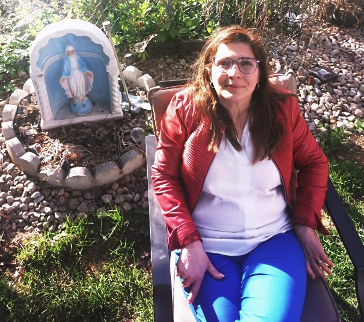
I was born in El Salvador and emigrated to Canada at the age of 20. My faith was cemented as a child with the love of Jesus and Mary. In Montreal, we actively participate as lay people in different pastoral activities of the church such as catechesis and, since the beginning of the pandemic, with the technology team to bring the Word of God to homes through internet transmissions.
To be Marist is to be open to the needs of others and to share and grow together. To be Marist is to say how I can do my best for the community.
The Marist vocation is service, and I am a catechist and part of the coordination of the “Technology and Evangelisation” team. This desire for commitment was born after a retreat-meeting of the Arco Norte Region, in Mexico, in 2015, in which we were asked a question about what we were going to do when we left that retreat. My answer was to participate in catechesis and, just as Saint Marcellin Champagnat invited the Marists, in their beginnings, to teach the love of Jesus and the Good Mother to others, through catechesis and education, to give time, dedication and affection for the building of the Kingdom of God, that was the way I began to respond to the commitment I had made. Later, two pilgrimages to the Hermitage deepened my Marist vocation.
For me, to be Marist is to keep in mind our three pillars of Marist life: spiritual, family life and especially to be involved in the pastoral needs of the church and society, seeing where I can be useful. And since the pandemic limited our face-to-face meetings, we have been very active in meeting virtually and especially with very limited resources to bring broadcasts of Masses and events of relevance to the communities so that they do not feel lonely or lose contact with them. Thanks to the Marist community we have had great support in terms of technology, collaboration and formation.
It is a blessing to be part of this beautiful fraternity and the Marist community of Champagnat.
What does it meanto be Marist?
María Bibiana Enríquez Rodríguez – Mexico

Being a Lay Marist is a blessing, because it has allowed me to be myself, from my essence, from my feelings, from my heart. It is a heart that beats very strongly every time I hear the laughter of a child; every time I share food with people I do not know but who, on establishing contact, speak the same language, that language of being Marist where we can share so many experiences and at the same time so many goals to accomplish, each one from his or her own place but which in the end have the same purpose: To make Jesus Christ known and loved.
I strongly hear this call to share light, to give it all, to give witness, to share joy and to accompany children and young people and, why not, the Laity themselves, to not let them extinguish their light, because I am in this world to serve, to offer my hand or, if possible, my shoulder so as not to let them fall.
It gives me so much joy to be a Lay Marist because today I can vibrate in the same tune with so many people known and unknown, to vibrate in the sense of LOVE, like that love of Our Good Mother for all her children, with the faith and strength that Saint Marcellin Champagnat had, not to let himself be defeated and to follow his mission.
My lifestyle, where Jesus accompanies me, has allowed me to recognise myself as a person who is always ready to share, with simplicity, honesty and love. I feel part of this great Marist family, where we sing the same melody, in one heart, one spirit.
What does it meanto be Marist?
Olga Liliana Salinas Casallas – Colombia
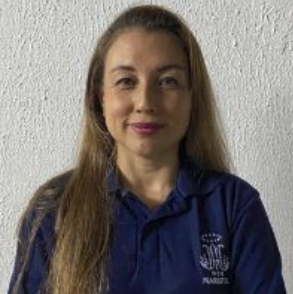
I am Olga Liliana Salinas Casallas, a lay Marist linked to the charism since 2017, I live in the city of Armenia, I coordinate the group of lay people JESMAR and I participate and guide the new project of the Province, the lay Marist youth. My story in the Marist life began 12 years ago when I came to know this charism because my son entered the Champagnat school. Little by little I became aware of the philosophy on which the education my son was receiving was based. That is how, in 2012, I became a teacher at Saint Joseph’s College and it is there that I began my journey in lay life and where I fell in love and became passionate about what I knew about the Founder, the Institute and this beautiful charism as a way to follow Jesus.
Personally, what moves me most, motivates me, makes me vibrate and sustains me, on the one hand, is to have in Mary Our Good Mother the model of a woman, of a mother and, above all, of a disciple. And, on the other hand, solidarity: that which knows no limits or frontiers; that which is based on recognising Jesus in the face of every human being by faith; that which does not measure or condition, that gives without expecting anything in return, for which being is more important than having; that which allows us to be the face of Jesus in the midst of uncertainty and discouragement, and which allows us to build bridges to tear down walls and restore lives.
Many ask me: why be a Lay Marist? My answer: because it is a way of life that I love, that I am passionate about and that motivates me every day. Being a Lay Marist has been the way in which the Lord has given me the gift of following Him by living my vocation through the gift of this beautiful charism. All that I have learned in my formation as a lay person, as a lay animator, the experiences in the national and international meetings, and above all, my vocational discernment journeys, have helped me to grow as a person, as a Marist and as a protagonist of our Church and have strengthened me to give ever more faithful and audacious responses.
In this journey, I have also been given the opportunity to help others to grow. To be a lay Marist is to want to live the faith in a particular way, hand in hand with Mary, at the service of others.
Finally, I dream that this legacy inherited from Father Champagnat and the first Brothers, and which is now given to us Brothers and Lay Marists, will remain in history, transforming lives, filling them with illusions, dreams, hope and opportunities for all those who are forgotten and marginalised in society. May the Good Mother continue to be that ordinary resource that holds the hands and hearts of all of us Marists of Champagnat.
Arco Norte: a new present, a better future
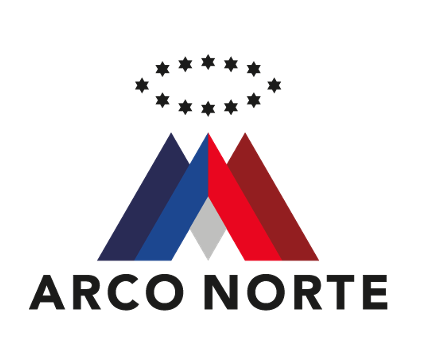
“We feel that God is at the root of this hope, where the seeds of a future for our regional process are everywhere to be discovered. Hope makes us creators of a new present, as our motto says, which anticipates God’s future, which is a better future. This hope is taught to us by Mary and Champagnat” (Arco Norte: a new present, a better future. Final message of the Regional Forum, 26-27 October, 2020).
These final words of the message of the Forum of Arco Norte, held in October last year, express in a meaningful and beautiful way the moment we are living in the Region, which integrates six provinces of the Marist Institute (Canada, United States, Central Mexico, Western Mexico, Central America and Norandina) and 14 countries with a cultural, linguistic, political and social diversity, at the same time complementary, but invited to walk together and build bridges in Marist life and mission.
If you would like to know more about the vision, mission, data and initiatives of Arco Norte, I invite you to visit the web page.
The history of Marist Arc North has been slowly building and consolidating, driven by the General Administration, in a bold commitment to bring to life the call of the XXII General Chapter: Let us walk together as a Global Family!
This process has been a journey of years, and it continues to be gestated with hope and to create a fruitful present for the Region. It is important to acknowledge with gratitude the support and impetus given by the Regional Council, made up of the Provincials of each of the Provinces and the Regional Coordinator, Br. Gregorio Linacero (Central America).
The first years were marked by meetings, dialogue, research and awareness of needs, leading to the development of a common vision and mission, together with strategic planning with various initiatives in the areas of Marist life, education, evangelisation, economics, communications and language skills. These areas are animated by teams made up of individuals from the different provinces.
The events that have had a significant impact on the progress of the Arco Norte Region have been:
- The meeting of the General Council and the Provincial Councils of the six Provinces of the Region of Arco Norte, held in Quito (Ecuador) from 8 to 11 March 2016. It could be said that this “Ist Regional Assembly” constitutes the founding moment of Arco Norte as a region, where all the provinces take on the commitment to move forward together.
- The Second Regional Assembly, made up of the six provincial councils of the Region and some invited lay leaders, held in New Jersey (United States), from 21 to 25 October 2019, where the progress was evaluated and the need to consolidate the regional processes was confirmed.
- The Regional Forum held on-line, on 26 and 27 October 2020, with the participation of the provincial councils and the members of the various teams in the region. It was an extraordinary moment of fraternity, where the common vision was strengthened, the new organisation was confirmed, and the commitment to promote the planned initiatives in a decisive manner was renewed.
- I invite you to get to know and deepen the message of this Regional Forum.
At this moment, we have been taking firm and sure steps in the organisation and follow-up of the Strategic Planning, with a new vision resulting from the re-working of SWOT, based on the experience and impact of the pandemic; in an attitude of listening and responding to the new emerging and common realities in the region, such as migration, the increase in poverty, violence, high levels of corruption, political instability…
The Regional Council appointed an Executive Secretary, Br. Rodrigo Espinosa (Mexico Central) to strengthen the current eight Regional Teams (Brothers today: Initial and Ongoing Formation, Marist Laity, Vocation Culture, Education, Evangelisation, Finance – Evangelical Use of Goods, Communications and Language Skills, together with the Continental Networks: Spirituality – Marist Patrimony and Solidarity.
The Regional Committee is another important body. It is made up of the coordinators of each team and its task is to carry forward the initiatives of the Strategic Planning corresponding to its area of animation.
A symbol of this moment of evolution through which we are living is the new logo of the region that unites us, identifies us and brings us together.
Despite this complex and difficult time through which we are living, due to the pandemic, where several initiatives have been affected, it is important to highlight the responsibility, generosity and creativity of the regional teams in their efforts to provide an authentic and effective response to the current situation. The discovery and strengthening of communications, virtually, has generated a new way of operating and relating to each other, creating a series of new initiatives and a large network of support and connectivity.
As a region we are at an opportune moment of consolidation and stability of processes and teams, so that we can carry forward the initiatives, also aware of the moment of transition that we are living in the Regional Council, with the change of leadership in most of the Provinces, but all convinced and committed. We are all convinced and committed to “building a new present and a better future”.
Fraternally yours,
Br. Hipólito Pérez, Provincial of Central America
Patricia Cecilia Ríos Gómez (1957 – 2021)
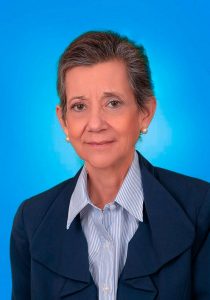
The Bureau of the Laity gratefully remembers our dear friend Patricia Cecilia Ríos Gómez, an outstanding lay Marist.
She belonged to the Marist Province of México Occidental and served the Institute as a member of the Extended Bureau of the Laity for two terms, from 2011 to 2017, representing the Arco Norte Region.
Paty, as we affectionately called her, was born on 22 November 1957 in Ciudad Juárez, Chihuahua. Married to José Carlos Sánchez and mother of 3 children: Diego, Rodrigo and Alejandra. She was an educator and director at the Marist School in Tijuana, where she lived since 1980.
She actively participated in the creation of the Tijuanense Marist Family “Fatima” in 1998, a fraternity belonging to the Champagnat Movement of the Marist Family.
Her service as a committed lay Marist stands out:
- From 2010 to 2013 she was a member of the Joint Commission of Brothers and Laity in the Marist Province of México Occidental.
- In 2012 she began her work as a member of the Commission for the updating of the Champagnat Movement of the Marist Family.
- From 2013 she participated in the Continental Commission of America, as a member of the Enlarged Bureau of the Laity.
- Her service in the Extended Bureau of the Laity (2011 – 2017) allowed her to meet with brothers and lay Marists from different cultures in different countries, an experience that she reflected in her service.
- In 2020 she became a member of the Provincial Commission for the drafting of the Manual of the Nuclei Development (New Provincial Structure).
- In August 2020 she joined the work of the Council for Marist Mission and in October she took charge of the Laity Area in the Charismatic Formation Nucleus, in which she set in motion a formation itinerary for lay Marists.
We have enjoyed Paty’s company for 63 years. She is an example of a lay person committed to Jesus and to the Marist charism. She lived in every context her experience of faith as a transforming encounter as a mother, wife, educator, animator and formator.
On 06 April 2021 she left for the arms of the Good Lord to join her husband José Carlos and other Marist laypeople and brothers who have preceded us.
We are grateful for her life, may the Lord bless her and may Our Good Mother and Marcellin accompany her.
